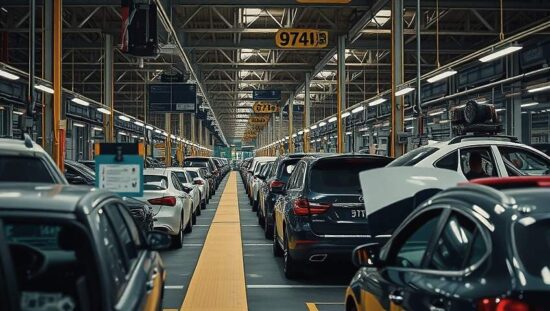The German Left party is escalating the debate surrounding the future of the nation’s automotive industry, demanding a radical intervention from the government to avert widespread economic and social disruption. Ahead of a critical auto summit at the Chancellery on Thursday, the party unveiled a ten-point plan centered on the creation of a €20 billion annual state transformation fund, designed to guide a socially and ecologically responsible overhaul of the industry and its supply chains.
The plan sharply criticizes the industry’s decades of prioritizing profit over proactive adaptation, arguing that a state-coordinated emergency program is now essential for survival. The Left’s leadership fears the summit will devolve into a “performance showcase” by corporate executives who have demonstrably failed to address the looming challenges. Party leader Ines Schwerdtner warned that the current trajectory risks jeopardizing entire production sites, fracturing supply chains and undermining regional economic strength.
The party’s proposal goes beyond mere financial support, advocating for a fundamental shift in power dynamics. They assert that the transformation process shouldn’t be dictated solely within boardroom meetings, pushing for the establishment of joint transformation councils at both national and state levels. These councils, crucially, would include equal representation for unions, works councils, scientists and civil society, granting them binding co-determination rights in major investment decisions.
The envisioned transformation fund would be earmarked exclusively for businesses committed to preserving jobs and locations, maintaining fair wages and adhering to collective bargaining agreements. Crucially, any company receiving state aid would be prohibited from awarding bonuses to executives and managers – a direct rebuke of perceived corporate excess.
Beyond direct investment, the Left is proposing a “social leasing model” for electric compact and subcompact cars, heavily subsidizing rates for lower- and middle-income households to ensure affordable access to climate-friendly mobility. Purchase incentives would be restricted to fully electric vehicles and scaled according to income, with an additional bonus assigned to vehicles equipped with EU-produced batteries, intended to bolster regional value chains. Furthermore, the party advocates for quotas for the use of green steel and aluminum sourced from Europe, further supporting domestic production.
The Left’s demands represent a significant challenge to the government, signaling a deep skepticism regarding the industry’s ability to navigate the transition independently and highlighting concerns about the social consequences of a rapidly changing industrial landscape.





